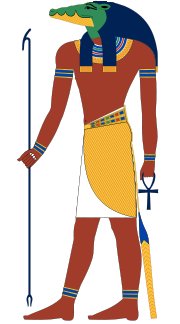Egyptian astrology/mythology

Sobek, the Egyptian ancestor of Saturn, is Set in his elder years, Set in his wisdom. Sobek, the crocodile-headed god, represents the limbic system of our brain. The limbic system - our reptilian brain - wants only to survive. This is the preverbal, nonthinking reactive mind, the aspect of self that assesses each situation for its threat potential.
Sobek must be seen in relationship to Horus, for Sobek is one partner in the eternal dance between that which we fear to release and the new lively force that is being born within us. At his worst - when Sobek overpowers Horus - he damns up the flow of our own creative force, and some part of us dies. At his best, he grounds our young creativity until it has the strength and power to soar on its own.

In the high drama of Egyptian Religion, Seth plays the necessary role of bringing death to the world by casting his divine brother Osiris, into the mighty river Nile. When Osiris is returned to life briefly by the magic of his loving sister-wife, Isis, the sequence of disintegration and regeneration into a higher form is born. Seth embodies the powerful forces needed to bring about great change. Ultimately defeated by Isis and her son, the falcon-god Horus, Seth becomes a free spirit, a wanderer on earth and, after his forced exile, the god of desert solitude.
Those born under the sign of Seth seek change and are forever searching for their wholeness. They must experience many adventures before finding themselves and being able to direct their strong inner powers. They readily learn from their mistakes and possess a tenacity in their challenges unrivalled by any other sign.
The essence of Seth is metamorphosis, the cocoon of life is ever expanding to embrace new knowledge and insight The Seth personality is called upon to lead the way into these unexplored dimensions.